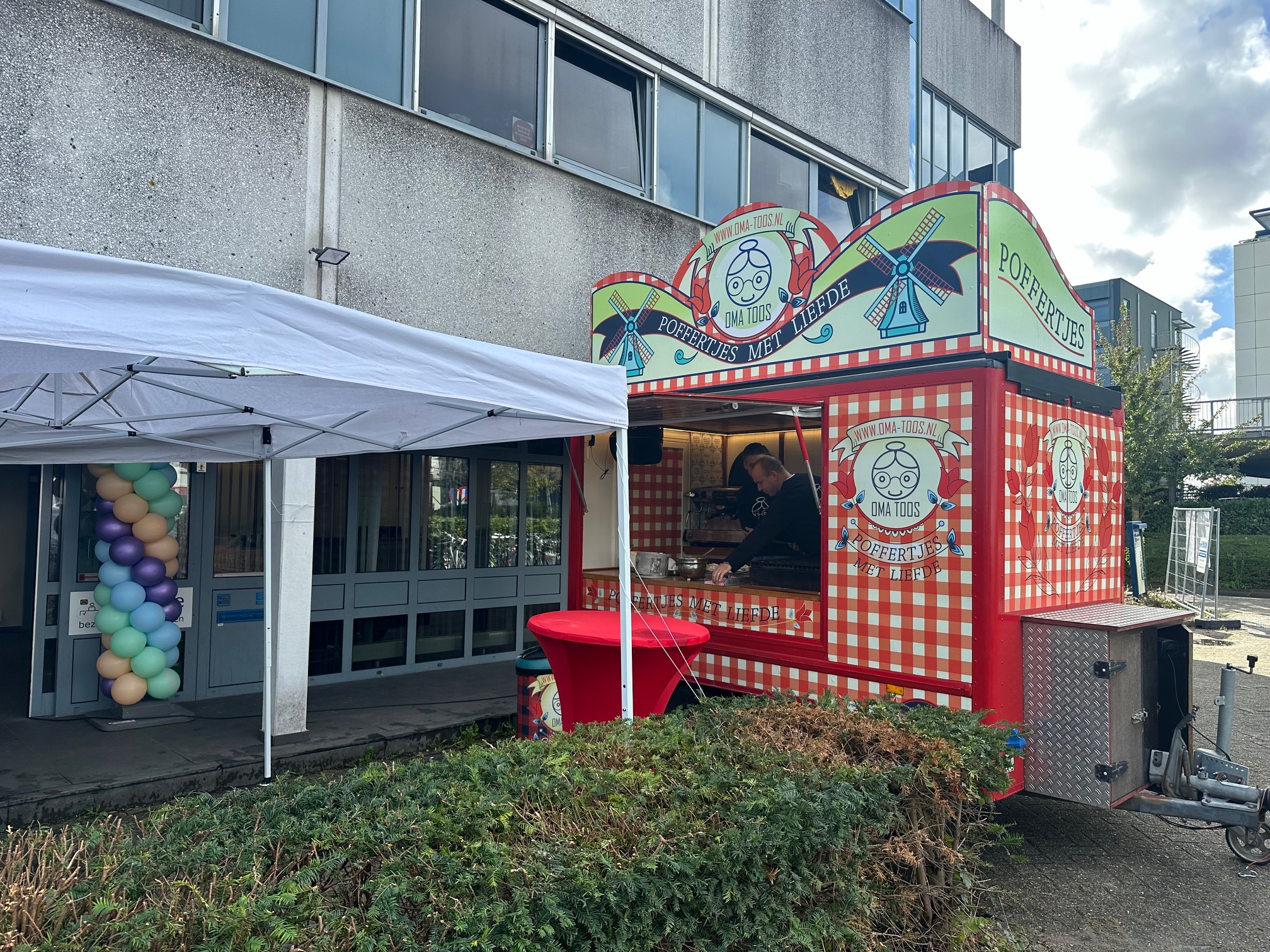Open Azc Day: A glimpse of the life of the refugees next door
Lauren Comiteau
On Saturday 28 September, the Central Agency for the Reception of Asylum Seekers (COA) held its annual Open Azc Dag, or Open Asylum Seekers’ Centres Day. More than 125 asylum reception centres nationwide threw open their doors to the public so people could get a glimpse of the daily lives of asylum seekers while meeting their newest neighbours. Lauren Comiteau visited Azc Overgoo in Leidschendam-Voorburg to find out more.
Azc Overgoo was set up as a temporary asylum seekers centre for “unaccompanied minor aliens” or AMVs—in this case boys aged 15 to 18. On this Open Day, a poffertjes truck and balloons grace the outside of the non-descript building, while a dance performance, foosball table, piñata and Syrian and Eritrean stews offer entertainment and sustenance inside.
Seventeen-year-old Somalian X (his name has been withheld to protect his identity) eats Dutch poffertjes while recounting how he came to the Netherlands. He arrived at this centre just six months ago, having made the treacherous – and in his case, one-year long – journey to Turkey and then by boat to Greece.
He eventually made his way to the Netherlands, which was his destination from the start. “I heard Dutch people were helpful,” he says.
X is one of what the UNHCR estimates is some 750,000 Somalis who have fled the country, many due to the fighting between government forces and local militia that broke out in 2023. X fled the fighting by himself for one simple reason.
“I don’t know where my family is,” he says.
That includes his parents and older sister.
He now shares a “home” with some 80 other unaccompanied minors from countries including Syria, Ethiopia, Ghana and Gambia. In this temporary shelter set up by COA under the asylum distribution law, which aims to make sure refugees are spread around the country, the teens learn to cook and clean up after themselves, go to school, learn about Dutch customs and have special pre-paid bank cards. Every resident has his own guardian.
“We teach them to be independent,” says a COA worker who takes a group of neighbours through the centre, showing us the kitchen, laundry room and the living room featuring a TV and PlayStation.
“Some residents couldn’t cook before they came here,” says our guide. “We gave them cooking lessons and now they cook better than me!”
Festivities
On this Open Asylum Seekers’ Centres Day, which purposefully coincides with National Neighbours’ Day, people come to meet their “newest neighbours”.
“I’ve never been to an Azc, although of course I’ve read about them in the news, and we live nearby so I wanted to see it for myself and show my daughters how young people can live when they’ve had to flee to another country,” says Ronit Waterlander, who visited the centre with her husband and two daughters, aged three and eight.
“I wanted to show them that other kids in the world are not as fortunate as they are to live in the Netherlands and to be born here with all the facilities we have. So just to open their minds, although of course I won’t tell them everything. But it’s nice to see a place where they’re taken care of. That’s how I explained it to them.”
There are several residents milling about, wearing slippers, entering and leaving their locked rooms, talking and eating. Many seem genuinely glad for the neighbourly company.
The future
This asylum centre has an agreement with the municipality to run until December 2026. According to CBS statistics, some 48,500 asylum seekers entered the Netherlands’ in 2023, 5,805 of who were unaccompanied minors (the overwhelming majority of them boys).
The boys can only stay in shelters like this one until they turn 18, after which they are transferred to an adult facility if their cases are still being processed. For some, that means this temporary shelter will be home for the next two years.
“The pressure on the IND means long procedures,” says our COA guide, referring to the overwhelmed Dutch Immigration and Naturalisation Service.
The asylum issue remains front and centre in Dutch politics, with the governing coalition seeking to declare an asylum crisis that would sharply curtail the number of asylum applications, a move that opposite leaders say would sideline parliamentary debate on the issue.
And while municipalities wait to see what happens with the distribution law that the cabinet is considering scrapping, some are holding off on looking for new accommodation for newcomers.
But for X, his new “home” in the Netherlands is a literal lifesaver.
“They prepare us good,” he says. “We learn English and Dutch.”
He also has long-term dreams. “I want to be a footballer,” he says. “I want to stay.”
Thank you for donating to DutchNews.nl.
We could not provide the Dutch News service, and keep it free of charge, without the generous support of our readers. Your donations allow us to report on issues you tell us matter, and provide you with a summary of the most important Dutch news each day.
Make a donation